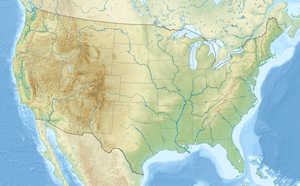The Ruby Lake National Wildlife Refuge is located in southwestern Elko County and adjacent northwestern White Pine County in the remote Great Basin area of the northeastern section of the state of Nevada in the Western United States. Established in 1938, near the end of the Great Depression of the 1930s, under the presidential administration of 32nd President Franklin D. Roosevelt (1882-1945, served 1933-1945), as of 2023 it encompasses 39,928 acres (161.58 km2)[1] of wetlands in Ruby Valley, just east of the Ruby Mountains and just south of Harrison Pass. It is 16 miles (26 km) long, up to 3 miles (4.8 km) in width, and lies at an elevation of 6,000 feet (1,800 m). Once the bed of an ancient 200-foot (61 m) deep lake, it is now a network of spring-fed marshes and shallow ponds serving as a habitat for hundreds of species of native and migratory birds and mammals.
| Ruby Lake National Wildlife Refuge | |
|---|---|
IUCN category IV (habitat/species management area) | |
 | |
| Location | Elko County, White Pine County, Nevada, United States |
| Coordinates | 40°12′07″N 115°29′35″W / 40.202°N 115.493°W |
| Area | 39,928 acres (161.58 km2) |
| Established | 1938 |
| Governing body | U.S. Fish and Wildlife Service |
| Website | Ruby Lake National Wildlife Refuge |
The Refuge is administered by the U.S. Fish and Wildlife Service, a longtime agency unit of the United States Department of the Interior. A Visitor's Center (located at 40°12′08″N 115°29′34″W / 40.202167°N 115.492833°W) and auto-tour route allow for discreet viewing of waterfowl.
Ruby Marsh
editRuby Marsh is a wetlands area within the national refuge, which serves as a nesting area for "the greater sandhill crane and trumpeter swan". In 1972, Ruby Marsh, which is located within the Ruby Lake National Wildlife Refuge, was designated as a National Natural Landmark by the National Park Service of the United States Department of the Interior.[2]
References
edit- ^ "Ruby Lake National Wildlife Refuge".
- ^ "National Natural Landmarks - National Natural Landmarks (U.S. National Park Service)". www.nps.gov. Retrieved March 24, 2019.
It is a stopover and nesting area for many migratory birds, including the greater sandhill crane and trumpeter swan.
External links
edit- Media related to Ruby Lake National Wildlife Refuge at Wikimedia Commons
- Refuge website
This article incorporates public domain material from websites or documents of the United States Fish and Wildlife Service.


